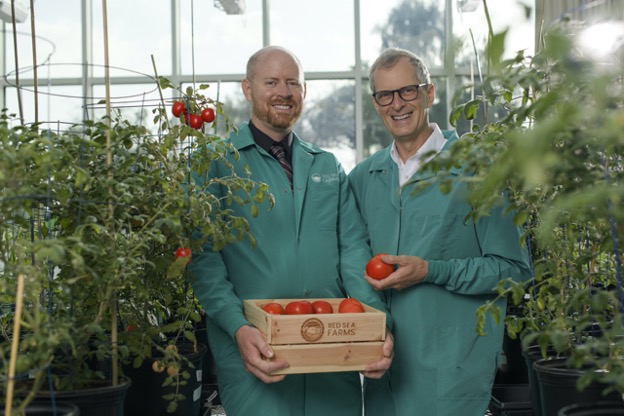Red Sea Farms is a Saudi Arabian AgTech start-up known for its saltwater agriculture, secured $16 million in their latest funding round, including investors from Saudi Arabia, the United Arab Emirates (UAE) and the US.
The funding round was led by Aramco’s venture arm Wa’ed, the Saudi government-owned Future Investment Initiative (FII) Institute, KAUST, Global Ventures, AppHarvest, and Bonaventure.
Since 2018, the start-up’s goal and vision has been to unleash the potential of using saltwater as a way to reduce the carbon footprint and water usage of the food sector. Red Sea Farms is accomplishing this by developing environmentally sustainable and salt water-based agriculture systems.
The fact that this company is based in Saudi Arabia is significant; the landscape around the Persian Gulf is mostly sand and saltwater, with little access to freshwater to support agriculture.
Red Sea Farms’ patented system uses solar and growth monitoring technology. Freshwater is typically used to cool greenhouses and irrigate crops, but using saltwater cuts the freshwater consumption by 85 to 90 percent. Nevertheless, saltwater acts in a similar way to freshwater but cuts the facility’s carbon footprint.
Additionally, while salt can crystallize within irrigation equipment, the Red Sea Farms technology eliminates that and prevents clogs from occurring. The greenhouse also uses smart covering, which protects crops from the heat and solar-panel-powered fans built within the greenhouse as well.
As the climate changes significantly in various regions around the world, farmers are experiencing difficulty in growing crops. This innovation aims to provide farmers with more options around the world where freshwater is not easily found.
“Red Sea Farms is thrilled to have substantially exceeded its target for the current funding round. We look forward to working closely with our investors and our Red Sea Farms team to accelerate plans to roll out our technology in Saudi, the Middle East and North America,” said Ryan Lefers, chief executive officer of Red Sea Farms, in a press statement.
The company has trialed its technology in producing sea asparagus, purslane and strawberries, but their most successful produce is tomatoes. This is the reason that Red Sea Farms is focusing on selling tomatoes from Saudi Arabia and distributing them in the Middle East.
“We are proud to have designed, developed and delivered one of the world’s most sustainable agricultural systems from our base in Saudi Arabia,” said Lefers in a different press release.
“The investment from our new partners will help us improve global food security while reducing the carbon and freshwater footprint.”
The company wants to use some of the funds to explore the US and see where growing conditions are harsh in order to provide them with agriculture opportunities.
Red Sea Farms hopes to explore further growth opportunities and gather investors in the next round of funding in 2022. The company sees great potential as the growing trend for investing in sustainable projects continues to contribute to the UN Sustainable Development Goals.












Join or login to leave a comment
JOIN LOGIN